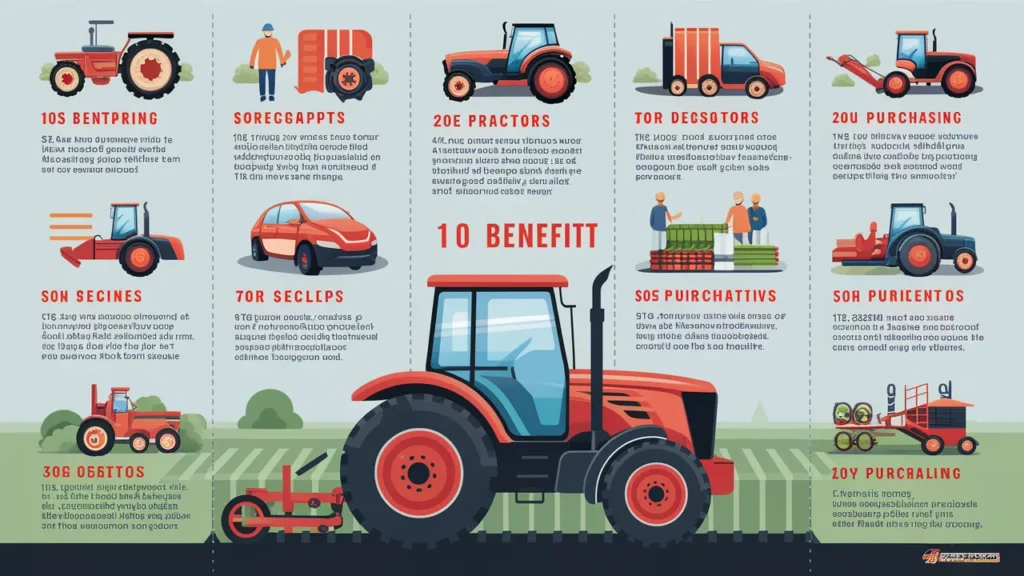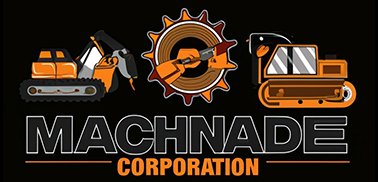Leasing tractors can offer several advantages over purchasing, especially for businesses in agriculture and related industries. Here are the top 10 key benefits:
- Lower Initial Costs: Leasing requires a lower upfront payment compared to purchasing, which helps conserve capital for other operational needs or investments.
- Improved Cash Flow Management: Lease payments are spread out over time, which can aid in better budgeting and financial planning by avoiding large lump-sum expenditures.
- Access to Latest Technology: Leasing allows businesses to use the latest tractor models with up-to-date technology, improving efficiency and productivity without the commitment to long-term ownership.
- Maintenance and Repairs: Many lease agreements include maintenance and repair services, reducing the burden and cost of upkeep and ensuring that the equipment is always in good working condition.
- Flexibility: At the end of the lease term, businesses have the option to upgrade to newer models, return the equipment, or sometimes purchase it at a residual value. This flexibility is beneficial in adapting to changing business needs.
- Tax Advantages: Lease payments can often be deducted as a business expense on tax returns, potentially offering tax benefits over depreciation and interest expenses associated with purchasing.
- Preservation of Credit Lines: Leasing does not usually require large loans, which means businesses can preserve their credit lines for other investments or operational expenses.
- Avoidance of Depreciation: Tractors depreciate over time, and leasing transfers the risk of depreciation from the user to the leasing company, which can be particularly advantageous in managing financial risk.
- Ease of Budgeting: Fixed monthly lease payments provide predictable expenses, simplifying budgeting processes and financial forecasting.
- Reduced Obsolescence Risk: With rapid advancements in tractor technology, leasing helps businesses avoid the risk of owning outdated equipment, ensuring that they remain competitive with modern machinery.
Overall, leasing tractors can provide significant financial, operational, and technological benefits, making it an attractive option for many businesses.
Leasing tractors has emerged as a strategic alternative to purchasing within the farming community, reshaping the traditional landscape of agricultural equipment acquisition. As technological advancements revolutionize the agricultural sector, more farmers are veering towards leasing agreements over outright ownership.
This paradigm shift stems from an array of compelling reasons that transcend mere financial considerations. The traction towards tractor leasing is underpinned by a synergy of factors ranging from operational flexibility to sustainable practices.
Amidst the ever-evolving demands of modern agriculture, the rationale behind opting for tractor leases becomes increasingly nuanced and multifaceted. Efficiency-driven decisions underscore this shift as farmers seek economical yet innovative solutions to meet their evolving needs.
While the idea of relinquishing ownership might seem unconventional at first glance, delving deeper uncovers a tapestry of benefits that encapsulate not only financial prudence but also operational agility. It is this intricate interplay between pragmatism and adaptability that positions leasing as a cornerstone in the strategy repertoire of today’s forward-thinking agricultural stakeholders.
Benefits of Leasing Tractors.
Cost Efficiency plays a crucial role in the decision-making processes of farmers, and leasing tractors offers a notable advantage in this aspect. By opting for a lease agreement instead of an outright purchase, farmers can alleviate the substantial upfront costs typically associated with acquiring new tractors.
This reduction in initial financial outlay allows farmers to allocate their resources more efficiently across various farm operations. For instance, a farmer considering expanding their fleet might find it more manageable to lease multiple tractors simultaneously rather than making significant capital investments all at once.
Access to Latest Technology is another compelling benefit that leasing tractors affords to farmers. Agricultural technology continues to evolve rapidly, introducing new features and efficiency-enhancing capabilities in modern tractor models.
Through leasing agreements, farmers can gain access to these cutting-edge technologies without bearing the burden of high purchase costs. For example, a farming operation focused on precision agriculture techniques could benefit from leasing a tractor equipped with advanced GPS systems for optimal field management without worrying about the heavy upfront expenses associated with purchasing such sophisticated equipment.

Flexibility in Upgrading stands out as a key advantage of choosing to lease tractors over buying them outright. Farming needs are subject to change based on crop rotation schedules or alterations in production techniques. With lease agreements, farmers have the flexibility to upgrade their tractor models as needed to align with evolving farm requirements.
This adaptability ensures that farmers can always utilize machinery that best suits their current operational demands without being tied down by the constraints often present when owning equipment outright.
For instance, a farmer transitioning from conventional farming methods to organic practices may find it beneficial to switch to leased tractors designed specifically for sustainable agriculture practices without facing obstacles related to ownership transfers or depreciation concerns.
Maintenance and Repairs.
When it comes to maintenance and repairs, leasing tractors offers farmers a host of advantages that can streamline operations. One of the primary benefits is the reduced maintenance responsibilities that come with many tractor lease agreements.
Farming equipment can undergo wear and tear due to heavy usage, but with leasing, maintenance services are often included in the agreement, relieving farmers of the burden of arranging and funding repairs. This means that farmers can focus more on their core operations without having to worry about the technical upkeep of their machinery.
Moreover, fixed monthly payments under a lease allow for cost predictability when it comes to maintenance expenses. By knowing exactly how much they need to allocate for tractor maintenance each month, farmers can better plan their budgets and avoid unexpected spikes in repair costs.
This financial predictability is especially beneficial during periods of economic uncertainty or market fluctuations where managing expenses becomes crucial for sustainable farming practices.
In addition to proactive maintenance services, leased tractors benefit from quick resolution of mechanical issues. Since leases typically come with service level agreements ensuring timely repairs, farmers can minimize downtime on their farms due to equipment breakdowns or malfunctions.
Having prompt access to repair services ensures that farm activities run smoothly without extended interruptions, ultimately contributing to operational efficiency and productivity in agricultural settings.
Operational Advantages.
One of the significant operational advantages of leasing tractors is the seasonal flexibility it offers to farmers. In agricultural settings where the demand for certain types of equipment varies throughout the year, leasing allows farmers to adjust their tractor fleet based on seasonal requirements.
For instance, a farming operation may need more powerful tractors during peak harvesting periods and can easily scale down to smaller models during off-peak seasons without being tied to long-term ownership commitments. This flexibility ensures that farmers can efficiently match equipment capacity with workload demands, optimizing their operational efficiency.
Moreover, leasing provides customization options that cater to the specific needs of different farm operations. Farmers can work closely with leasing companies to tailor the specifications of leased tractors according to their unique requirements.

For example, farmers cultivating vineyards might need tractors with narrower profiles to navigate between rows effectively, while those focused on large-scale crop production may require higher horsepower models for heavy fieldwork. By customizing leased equipment, farmers can ensure that they have the right tools to maximize productivity in their particular farming contexts.
Another key operational benefit of leasing tractors is the ease of transitioning between equipment types as needed. Agricultural operations often involve diverse tasks that require different types of machinery at various stages of production.
With a lease agreement in place, farmers have the flexibility to switch between tractor models or even other agricultural machinery types without having to bear the logistical complexities and costs associated with selling, trading, or purchasing new equipment outright.
This seamless transition capability enables farmers to adapt quickly to evolving farm needs and technological advancements in the industry without being constrained by long-term ownership commitments.
Financial Benefits.
Leasing tractors can offer distinct financial advantages over traditional purchasing methods for farmers and agriculture business owners. One key benefit is the potential for tax deductions that may not be available when buying equipment outright.
Depending on the lease agreement structure and tax regulations, leased equipment expenses could qualify for tax benefits, reducing the overall taxable income of the farm operation. This aspect of leasing tractors helps in optimizing tax liabilities and enhancing financial efficiency.
Moreover, consistent lease payments facilitate efficient cash flow management, especially in volatile market conditions where unpredictable factors can affect revenue streams.
By spreading out costs through regular lease payments, farmers can better plan their budgets and allocate resources effectively without facing sudden cash flow challenges. This predictability in expenses allows for strategic financial planning and improved stability in managing operational costs throughout different phases of the agricultural cycle.
Another significant advantage of leasing tractors is the mitigation of asset risks associated with owning high-value machinery. When farmers opt to purchase equipment outright, they expose themselves to depreciation risks as the value of assets decreases over time due to wear and technological advancements.
Leasing eliminates this concern by transferring the ownership risk to the lessor, who retains responsibility for managing depreciation. Consequently, through leasing agreements, farmers can focus on operational activities while avoiding concerns about declining asset values impacting their balance sheets or resale prospects.
Environmental Sustainability Considerations.
When considering the environmental impact of farming activities, leasing tractors can offer significant benefits in promoting eco-friendly practices. Many tractor lease programs align with sustainable agriculture initiatives by incorporating environmentally friendly technologies and practices into their offerings.
For instance, some leasing companies may provide access to modern tractors equipped with energy-efficient engines that reduce fuel consumption and emissions, contributing to a lower carbon footprint on farms. By encouraging the adoption of greener machinery through lease agreements, farmers can actively participate in reducing their environmental impact while maintaining operational efficiency.
One key advantage of leasing tractors over purchasing is the relief from equipment disposal responsibilities at the end of a tractor’s lifecycle. Disposing of agricultural machinery properly can be a complex process due to safety and environmental regulations governing the handling of hazardous materials found in older equipment.

In a leasing arrangement, lessors often take on the responsibility of managing the disposal process in an environmentally responsible manner, ensuring that retired tractors are recycled or disposed of following industry standards for waste management. This feature not only simplifies the end-of-life process for farmers but also ensures that equipment is handled sustainably, minimizing its environmental effects.
In addition to lowering overall carbon emissions on farms through modern technology adoption, leasing tractors can contribute to broader sustainability goals within the agricultural sector.
By choosing lease agreements that encourage environmentally friendly practices and offer responsible disposal solutions for agricultural equipment, farmers play a role in supporting sustainable farming practices across various aspects of their operations.
The combination of promoting eco-friendly technologies and relieving farmers from end-of-life equipment burdens underscores how leasing tractors can align with holistic sustainability efforts in agriculture while meeting operational needs efficiently and responsibly.
Conclusion.
In conclusion, the benefits of opting for leasing agreements over outright purchasing of tractors in the agricultural sector are abundant and strategically impactful. The advantages outlined in this article cater to the financial, operational, and environmental considerations that weigh heavily on farmers, agriculture business owners, and equipment managers.
When deliberating whether to lease or buy tractors, it is essential to consider not just immediate costs but also long-term implications on efficiency, technology access, maintenance responsibilities, and asset risks.
The comprehensive nature of tractor lease agreements offers a robust framework for farmers to navigate through dynamic operational needs while also staying financially prudent. By leveraging the flexibility of upgrades, seasonal adjustments, tax deductions, and environmentally conscious practices that come with leasing arrangements, stakeholders can enhance their farm productivity sustainably.
Ultimately, the strategic choice between leasing and purchasing extends far beyond ownership status—it delineates a path toward modernizing agricultural practices while ensuring economic viability in a rapidly evolving industry landscape.









